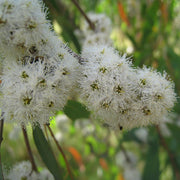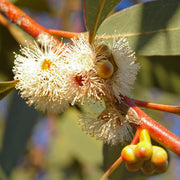Eucalyptus oil is a well-known favorite when it comes to helping with respiratory issues. Considering its remarkable ability to support healthy respiratory function, clear congestion, and reduce mucus, it’s no wonder! But did you know that there are several types of eucalyptus oil and that they each have different benefits due to their varying chemical components? That’s right, not all eucalyptus oils are the same, so it's important to know which one is best for your intended purpose before buying or choosing one for your blends. So how do you know which one to use and for what? Let us introduce you!
Meet the Members of the Eucalyptus Family
Eucalyptus trees, although mostly native to Australia, are now found all over the world due to worldwide cultivation. These tall, flowering trees are members of the Myrtle family (Myrtaceae) and are also often referred to as gum trees. Interestingly, eucalyptus trees can have the hardest and heaviest wood known (garnering it the name “ironbark”) and some species are considered both the tallest flowering plants in existence as well as among the tallest trees in the world. Now those are some impressive stats! Although there are hundreds of species of eucalyptus trees (sources vary from 600-900 species), only about 20 or so are used commercially. Out of those 20, only a handful are commonly used for essential oil production. To produce the incredibly fragrant and remarkably therapeutic eucalyptus oil that we all have come to know and love, distillers typically steam distill the leaves and twigs of the particular variety of eucalyptus tree of their choice. This process can also produce a beautiful eucalyptus hydrosol after the oil has been collected! Aromatics International carries four varieties of eucalyptus oil. These oils were handpicked by Karen Williams, Aromatic’s International’s Head of Sourcing, and are of the highest therapeutic quality and always 100% pure (GC/MS tested!). They are never adulterated or rectified. Ever. If you like eucalyptus, we are confident that you will fall in love with these beautiful eucalyptus oils. So, without further adieu, here are our favorite eucalyptus oils as well as a quick “bio” on each of them:
1. Eucalyptus Globulus Oil (Eucalyptus globulus) “crude” or “authentic”
Main Chemical Components:
- Oxide - 1,8-cineole (50-75%)
- Monoterpene - α-pinene (14-18%)
This intense, camphorous, woodsy eucalyptus globulus essential oil, also called blue gum, is one we often turn to at the first sign of a cold or flu to help support healthy lung function and boost the immune system. Its high content of oxides, including 1,8-cineole (52.96%), makes it brilliant for aiding the respiratory system. It acts as both an expectorant and mucolytic and has anti-inflammatory effects on the bronchial tubes, which helps decrease coughing and shortness of breath. Eucalyptus globulus is also a great antiseptic thanks to both its oxide and monoterpene content. It is an excellent choice for reducing the presence of bacterial, fungal, and/or viral activity. Additionally, eucalyptus globulus is known to have a stimulating, clearing, and uplifting effect on the mind and spirit. We love using this essential oil in steam blends, a diffuser, or a personal inhaler. Often, Eucalyptus globulus is rectified, so it is important to find one that is authentic or crude. Rectification is redistilling an essential oil thus removing specific components. This is done to boost the 1,8-cineole percentage. However, to increase the 1,8-cineole percentage means to decrease other components. The Aromatics approach is to use oils that are in their natural state (and not standardized or rectified). Authentic or crude eucalyptus globulus has a camphorous, medicinal, woody, penetrating and sweet aroma with green notes.
2. Eucalyptus Radiata Oil (Eucalyptus radiata)
Main chemical components:
- Oxides - 1,8-cineole (65-80%)
- Monoterpene - limonene (5-7%)
- Monoterpenol - α-terpineol (7-11%)
This fresh, camphorous eucalyptus radiata essential oil has an even higher 1,8-cineole content than the globulus variety (69.96%), making it exceptionally powerful for aiding with respiratory issues, soothing inflammation, and reducing unwanted microbes, including bacteria, fungus, and viruses. Its monoterpenol content can help ease muscle spasms as well as prove useful for strengthening the immune system. Eucalyptus radiata is uplifting and mentally clearing. It can help soothe when one is exhausted and can foster a sense of emotional fortitude. Eucalyptus radiata has a clear, fresh, camphorous aroma.
3. Eucalyptus Dives Oil (Eucalyptus dives)
Main chemical components:
- Ketone - Piperitone ( 35-48%)
- Monoterpene - α-phellandrene (20-29%)
- Monoterpene - p-cymene (6-7%)
- Monoterpenol - terpinen-4-ol (4-5%)
This strong, camphorous, slightly minty eucalyptus dives essential oil, also known as broad-leaf or blue peppermint, is quite different from the others, owing to its high monoterpene and ketone content. We love the bright peppermint notes! In addition to its natural calming and decongestant support on the respiratory system, it is particularly useful for soothing muscle pain and inflammation. The ketone and monoterpene content of eucalyptus dives also has rubefacient properties, helping to increase circulation. This lovely oil makes a wonderful addition to blends formulated for helping soothe arthritis, rheumatism, sprains, and even headaches. Eucalyptus dives also helps clear and soothe both emotionally and energetically. It is a fantastic choice for promoting mental clarity and can encourage motivation during times of increased exhaustion.
4. Eucalyptus Citriodora Oil (Eucalyptus citriodora)
Main chemical components:
- Aldehyde - citronellal (64-89%)
This fresh, lemony, camphorous eucalyptus citriodora essential oil is phenomenally calming and relaxing to the nervous system as well as the respiratory system thanks to its high aldehyde content. Eucalyptus citriodora, also known as lemon-scented gum originates from Australia and is cultivated in many other countries including South Africa. Distilled from the leaves and twigs, this is one of our favorite oils for helping to purify the system and our surrounding environment from unwanted bacteria, fungal, and/or viral activity. Eucalyptus citriodora makes its fame with all-natural bug repellents. This beautiful oil is very cooling and cleansing. It is ideal when needing to cleanse, freshen, and soothe the mind, body, and spirit. We love how this oil revitalizes and brings laughter to our space. Due to its unique aroma, this eucalyptus is often used in the perfume industry. Eucalyptus citriodora has a strong, fresh, lemony with a citronella floral aroma.
Eucalyptus Oil Safety
As much as we adore eucalyptus oil, there a few safety precautions we want to share with you. Due to the strong, potent nature of eucalyptus oils, they should be avoided on or near the faces of children under 10 years old. This includes in steam blends. Care must also be taken with asthmatics. Although research has shown that eucalyptus can help with bronchial asthma, it also has shown that it can potentially trigger an asthma attack. Some eucalyptus oils may also antidote homeopathic remedies. Additionally, Aromatics International does not recommend the internal usage of essential oils without significant education. The aldehyde component in eucalyptus citriodora, citronellal, can be a moderate skin allergen if used above 3% dilution. As with most oils, if oxidized, eucalyptus oil can cause skin irritation or sensitization. We recommend doing a patch test to check for skin sensitivities. It is also worth noting that eucalyptus is considered to be toxic to cats, so use with caution around your feline fur-babies!
Explore, Learn, & Meet New Oils
If you’d like to read more about the different chemical component groups and their therapeutic properties, check out our Chemical Families page. While you’re there, don’t be afraid to explore the rest of our learn section. If the aromatherapy “bug” has bitten you and you’d like to take the next step in your journey, we whole-heartedly recommend signing up with the Aromahead Institute, founded by the amazing Andrea Butje. You will LOVE Andrea’s classes! We hope you enjoyed meeting the eucalyptus family and can feel more confident in choosing which one(s) you want to add to your own. Let us know which eucalyptus oil is your favorite in the comments below!
9 Eucalyptus Oil Recipes
Below is a collection of some of our favorite recipes incorporating the various types of eucalyptus oil described above:














